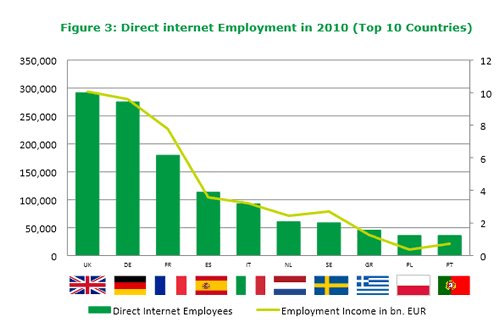According to research by Belgian Vlerick Business School, Europe has the potential to generate up to 1.5 billion extra jobs in the EU digital economy. In the report, ‘Online Jobs Boosting Europe’s competitiveness’, the authors write at least 400,000 extra jobs could be created. The internet sector is now found to employ 3.4 million people.
That’s approximately 1.6% of the total active population in the EU. The report, that was published in February 2013, takes a detailed look at the economic value of the EU internet sector. In order to understand the growth opportunities, it’s important to first define what is meant by the internet sector and the digital economy. The authors categorized the internet ‘as an ecosystem consisting of various layers, including infrastructure, applications, intermediary, and commerce.’
Impact of the internet sector on GDP
As the research is commissioned by the IAB Europe, an industry body representing mainly the online advertising sector and thus pushing for a more digital economy in the EU, among others via it’s IAB Europe AdEx benchmarks, the study pays a lot of attention to the role of Internet Service Providers and the digital marketing industry. Other segments include information technology consulting companies, e-commerce and the SaaS market.
The impact of all these and more segments (see below) on GDP growth is believed to be 119.9 billion euro, which is approximately 1% of the EU GDP (based on 2010 data). In some countries this contribution to the digital economy is higher (up to 6.3%).

A stronger digital economy in Europe: not without the help of the EU?
The authors estimate that Europe has the potential to generate 1.5 billion extra jobs in the digital economy. Probably the actual impact can be higher if we take into account activities that are less directly related to the internet economy as such. After all, digital is penetrating across all business functions and the whole enterprise.
However, to make the creation of extra jobs and a higher contribution of the industry to the digital economy possible the report calls upon the EU and provides some potential avenues to make it happen. The question remains what can be done in times where the EU has to deal with different challenges and which countries and even evolutions can take the lead.
In this regard, the IAB Europe and the authors state that if the EU aligns with the US average output (a similar methodology was used for the report as in the US), 400,000 jobs could be added in the EU digital economy.
The full report can be viewed here (PDF opens).

